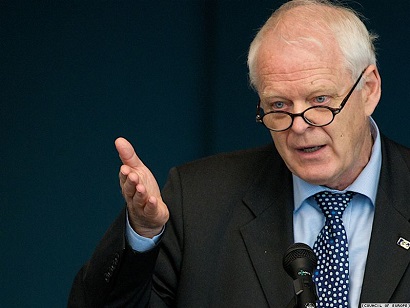EU adviser praises Georgia’s progress, offers further recommendations

Judicial independence in Georgia remains fragile and responsibility of individual judges needs to be strengthened, says EU special representative to Georgia in his farewell letter released today.
EU Special Representative and Adviser on Constitutional and Legal Reform and Human Rights, Thomas Hammarberg, forwarded a number of his final recommendations to the Georgian Government and other relevant institutions as he concluded his duties in the country.
In his report, Hammarberg underlined "significant improvements have been made in many of the human rights related areas” in Georgia.
He positively assessed:
- the adoption of the National Human Rights Strategy and Action Plan,
- increased judicial independence,
- the improved election environment and separation of the State and party political interests (in contrast with past abuse of administrative resources),
- progress on protection of privacy,
- progress on prison conditions,
- adoption of the new labour legislation,
- adoption of the new anti-discrimination legislation, and
- open and inclusive cooperation with Civil Society Organisations and free media.
"However, there remain challenges in reforming and strengthening democratic institutions,” the EU representative said.
"Judicial independence remains fragile and responsibility of individual judges needs to be strengthened; law-enforcement institutions still require significant reform, including establishment of an effective and independent mechanism for investigation of the complaints against law enforcement officials,” he wrote.
"Development of new legislation on surveillance has to be finalized and right to privacy ensured; frequency of inter-personal cases of violence, both political and domestic, require adequate response [and] cases of past abuses require effective and credible response.”
Hammarberg noted implementation of the labour code was also key. He said on top of setting up specific inspections on safety at work, there was a need to create an effective mechanism to oversee core labour standards.
"These issues are linked to the EU-Georgia DCFTA/AA and will in turn attract investors and business, who value legal and judicial security. Incipient social improvements need to be sustained, particularly focusing on vulnerable groups like IDPs, minorities, rural population, poor children, elderly or people with disability,” he said.
The Human Rights Advisor commented on the recent local self-government elections too. He said further improvements and clarifications of electoral legislation were needed.
He recommended that the possibility of the municipal council remove directly elected mayors, and two thirds of the voting should be revoked.
Hammarberg was sent to Georgia to act as the EU Human Rights Advisor following an invitation by the-then Prime-Minister Bidzina Ivanishvili in 2013. Before, he held the post of Council of Europe Commissioner for Human Rights in Strasbourg.
 Tweet
Tweet  Share
Share


